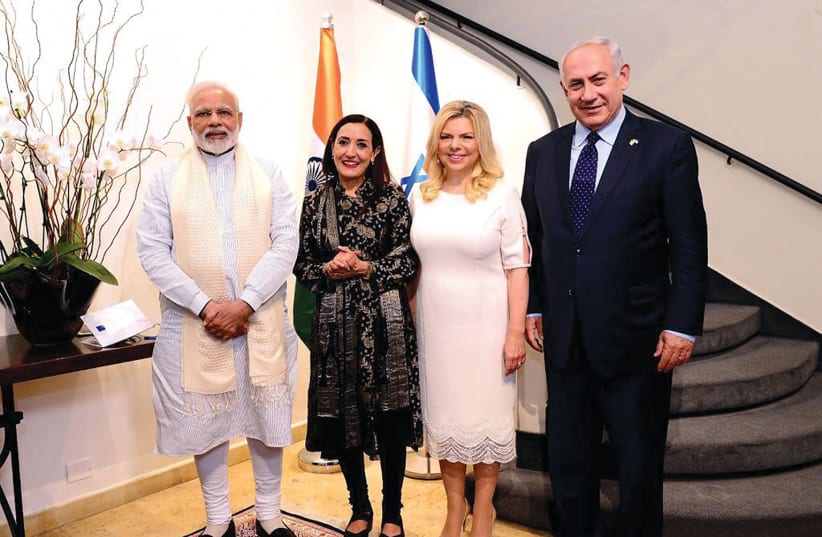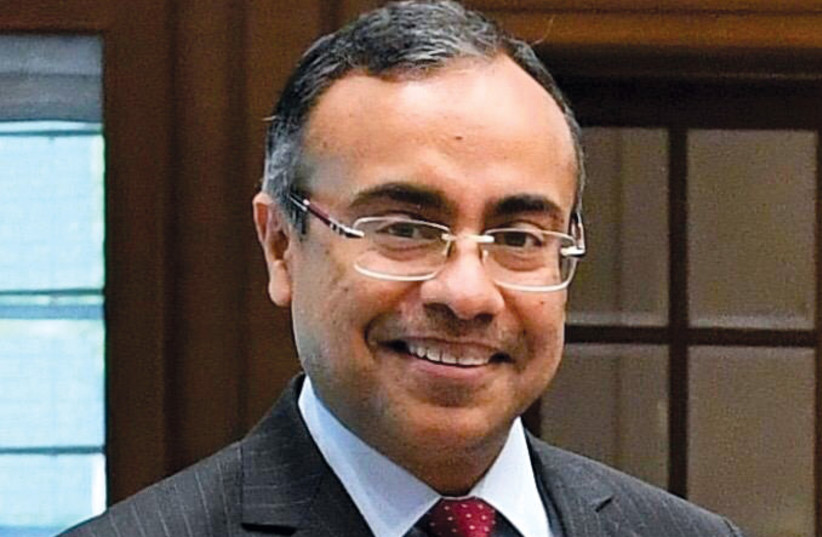Looking around the world, you will find no relationship more natural than that of Israel and India. Both modern states born less than 10 months apart under the heels of the British Empire, Israel and India have become formidable leaders in tech, industry, and culture despite their short histories. How has this happened, and what does the future look like for the two countries?
I posed these questions to the Indian Ambassador to Israel Sanjeev Kumar Singla, who spoke graciously of our country’s ties and how history has brought us together. “It is rare in Jewish history to have had a long, continuous period where it has thrived in freedom and equality as it did in India. We Indians are proud of that. It is this civilizational bond that enriches our contemporary understanding. Moreover, the Indian diaspora chose to make aliyah to Israel because they wanted to and not because of compulsion…The Indian diaspora in Israel has remained a positive force, supported Israel’s nation-building and connected our two countries. We recognize and value their contribution and those of others who have helped our relationship grow,” he said.
“It is rare in Jewish history to have had a long, continuous period where it has thrived in freedom and equality as it did in India. We Indians are proud of that. It is this civilizational bond that enriches our contemporary understanding. Moreover, the Indian diaspora chose to make aliyah to Israel because they wanted to and not because of compulsion…The Indian diaspora in Israel has remained a positive force, supported Israel’s nation-building and connected our two countries. We recognize and value their contribution and those of others who have helped our relationship grow.”
Kumar Singla
Looking at today, you would think that Israel and India have existed as independent nations for centuries. Both countries are at the top of the list with startup success stories, innovation and ground-breaking research. It is incredible that so much success has been reached in such a short time.
Since the establishment of full diplomatic ties 30 years ago, trade between the two has skyrocketed from $200 million to $7.8 billion. Of “unicorn” company founders – i.e., companies with a valuation of $1 billion or more – India is second with 90 founders, and Israel is third with 52. Looking at Israel specifically, being that it is a small nation with less than 10 million people, it has the most unicorn founders per capita. India, for its part, has its emigrants at the helm of the world’s largest companies such as Google, Microsoft, and IBM. This is coupled with the approximately 85,000 Indian Jews living in Israel today.
What is the secret to the success of these two countries?
Anat Bernstein-Reich, chairperson of the Israel-India Chamber of Commerce and CEO of BDO Israel-India Investment Banking; and Reena Pushkarna, Indian-Israeli restaurateur, both pointed to the common culture between the countries. Bernstein-Reich said that “values of family, tradition and education are extremely important to both peoples and allow for easy friendships to form.” For Pushkarna, this is the root of the relationship. “It all starts in the home – respecting family and elders,” she said.
For Ambassador Singla, the “organic linkage” is in the “shared values of democracy and pluralism. We also share some of our guiding civilizational philosophies: vasudhaiva kutumbakam in India, or ‘the world is one family,’ and tikkun olam in Israel, or ‘heal the world,’” he said.
Both countries also share a common history with their oppression by the British and historical civilizations. Indian soldiers also helped to liberate Haifa in 1918. This common bond has led to increasing economic growth, with companies like Amdocs from Israel and the State Bank of India from India opening up offices, R&D centers and factories in their respective countries.
Indian-American entrepreneur and investor Balaji Srinivasan has written about the growing partnership between Israel and India, noting their common bonds and unique growth on the global stage. He is very bullish on both countries’ abilities to lead the web3/decentralized economy future, writing that “all the pieces are there” to create what he calls “The Indo-Israel Independence Initiative” that can build decentralized Internet protocols to boost sovereignty, create capital and establish globally fair rules.
With India’s large population, food production and water scarcity are matters of great importance. Also due to religious and personal reasons, 31% of Indians are vegetarian and 81% heavily limit their meat consumption, according to a 2022 Pew Research study. This makes agriculture a huge industry in India. The country’s high temperatures and large desert areas make growing crops difficult, so Israel has been a strategic partner in helping blossom typically non-arable land. The two nations established the Indo-Israel Agricultural Project in 2006, and Israel has helped to introduce crops that are not native to India into the country, with an emphasis on olives. As a result, more than 112,000 olive trees have been planted in India. Singla also spoke about the I4F joint industrial research fund and the I2U2 initiative which aims to find solutions to challenges in the sectors of water, energy, transportation, space, health and food security in support of global efforts. He believes it is “a reflection of our two peoples’ spirit of innovation.” Much of this could be the reason for the Indian public’s 70% favorable view of Israel.
The relationship between the two countries goes beyond commerce. Israel’s and India’s military forces work together extensively. Seeing the success Israel has had in its defense activities, India has been a buyer of Israeli military equipment such as radar and missiles, trains with the IDF, and regularly takes lessons from its success. Speaking about the military relationship, Singla said, “We share similar challenges to our society from radicalism and terrorism, apart from many other fundamental geopolitical and geo-economic changes underway in our two geographies. It is, therefore, imperative that we have an ever-closer partnership.”
Today, Israel is India’s second-largest supplier of military equipment, trailing only Russia. With the war raging in Ukraine, it is very likely that Israel will become the largest supplier in the coming years. It was reported that India purchased 30 attack dogs from Israel, which were trained in the elite Oketz unit. This is alongside counter-terrorism and intelligence sharing.
DESPITE THEIR rapid growth, both countries see no sign of slowing down. Venture and private equity capital from overseas continue to pour in to their respective economies, with more and more founders springing up every year. This is not even taking into account India’s massive domestic economic opportunity with its huge population. Bernstein-Reich pointed to two fields with immense opportunity: pharma and mobility. India has emerged as the leader in the pharmaceutical sphere, producing much of the world’s medicines and vaccines. Israeli pharmaceutical giant Teva has opened plants in India, and Bernstein-Reich believes this is a field with “untapped potential.”
Over the past few years, Israel has become the global leader in mobility technology, with companies such as Jerusalem-based Mobileye leading the way. By the same token, India is a powerhouse in the automotive realm, with most of the major automotive companies manufacturing in India. According to Bernstein-Reich, who received the Friend of India Award in 2020 for her economic work, a large part of the deal flow between the two countries is happening in the mobility space and is continuing to grow.
Bernstein-Reich hopes that some of the differences, such as pricing problems, bureaucracy, and general attitudes toward hierarchy and time, can be overcome. She also sees an opening for “more support from the government to increase joint funds and programs to promote business” between the two countries. She believes that if these problems are smoothed out, trade can reach $15 billion, and more companies will begin to do business in each country.
In regard to culture: With a population of 1.3 billion people, India is emerging as a hub for the future. As it had been colonized by Britain for so long, English is widely spoken throughout the country, with over 125 million people speaking the language. That gives Indians the opportunity to set cultural trends as the world becomes ever more connected through the Internet and social media. Moreover, India has become a big tourist destination for Israelis, with many young Israelis traveling there on their post-army trip. This has become easier over the years with the increase in non-stop flights between Tel Aviv and New Delhi.
For Israel, its cultural influence is not new. In fact, much of Western thought and influence originates from the Torah and Hebrew civilization. This has only accelerated following the foundation of the modern State of Israel, with countries looking to Israel on a whole docket of issues. With its cultural and technical prowess, Israel has positioned itself to be a leader in the future.
Pushkarna, the self-proclaimed “food minister” who owns the restaurant Tandoori in Tel Aviv and Herzliya, spoke at length about the cultural ties between Israel and India. Having grown up in India and made aliyah decades ago, she has seen firsthand what she describes as “the mutual love, respect and trust” on all issues. For her, it all starts in the home. This is further reinforced by what she sees as Israelis’ love of Indian food. In her eyes, food is the world’s common unifier. When Indian Prime Minister Narendra Modi visited Israel, she cooked for Modi and then-prime minister Benjamin Netanyahu. “The love and respect Indians and Israelis have for each other will only lead to more success in the future,” she added, pointing out that both countries “have much to learn from each other in terms of technology and culture.”
Together, Israel and India have ties that are firm and only getting stronger. From a common beginning to booming tech ecosystems, the two countries are positioned to thrive together in the coming generations. Especially with Benjamin Netanyahu returning to power, experts predict a larger emphasis from Israel on its relationship with India – Netanyahu has a strong personal relationship with Modi. With the infrastructure in place at the government and private sector levels, the two countries are bound to continue growing closer and furthering their contributions to the world. ■
The writer, a Jerusalem Post staff member, is an entrepreneur and Hebrew thinker, known as Osher in Hebrew. A recent immigrant, he helps oversee the startup ecosystem in Jerusalem with Made in JLM. On Twitter: @troyfritzhand.

